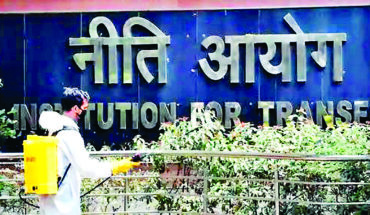With Spain and Portugal Plunge in Darkness, Power Disruption Haunts Europe
Admittedly, there is no direct evidence that the Chinese have invaded the power-grid systems in Europe’s Liberian peninsula comprising two developed economies of Spain and Portugal, but the apprehensions of a Chinese invasion haunts Europe. Its impact was being felt even in the adjoining areas of France.
With the peace efforts in Eastern Europe, Russian cyber aggression is being ruled out. The ongoing tariff war between the US and its western allies with China could be identified as one of the possible provocations. The delayed downloading of the electric cars in European ports have already caused much anger in China.
Meanwhile, India appears to be playing face with China. She has already opened her markets for the Chinese BYD electric bus chassis. By the end of January this year 2330 electric buses equipped with BYD electric bus chassis are operating in 35 cities across the country, representing a 24% market share. The buses are operating with the Telangana State Road Transport Corporation and the Kerala State Road Transport Corporation.
In India, the power distribution systems from China have already been functioning for more than a decade, but it could not be immediately ascertained how much Indian systems could be insulated from the Chinese cyber invasion, if it ever happens. In India, there is no immediate threat to the power grids, but the caution, perhaps, could be emphasised following the collapse of the power distribution systems in Spain and Portugal
With the state-of-the art technologies being used for the power distribution in Spain and Portugal, few are ready to accept the claim being offered by the governments of Spain and Portugal that the power breakdown has been caused by sharp temperature swings in the atmosphere. Portugal’s grid operator, REN, has claimed that “a ‘rare atmospheric phenomenon’ is the cause of the widespread shutdowns.
The governments in two countries, perhaps, are reluctant to share the details of the break-down, but the sudden collapse in the distribution of power has panicked Europe. The train services have suddenly been suspended, thousands of passengers stranded; even the airports were being managed with the backup power systems, and the traffic chaos has hit these two countries. The plight of patients in hospitals was palpable. Only emergencies were functioning with backup generators, and metro systems suffered sudden breakdowns.
Spain has declared a state of emergency in what is described as Europe’s biggest power failure. Meanwhile, it is being stated that almost 82 per cent of power has been restored, according to Spain’s electricity operator, REE.
The Denials- For many, it appeared quite intriguing that while Antonio Costa, President of the European Council and Portugal’s former prime minister, stated that the exact cause of the disruption is to be ascertained, he also has promptly claimed “There was no evidence pointing to a cyberattack”.
It may be recalled that during the tenure of the Prime Minister, Boris Johnson, the British wanted to censure China for the leak of the Covid-19 virus, but through backdoor diplomacy, according to reports Beijing had warned him that the British nuclear power stations are being run on the Chinese systems, including software; and if necessary it could stop the power systems in the UK. It, perhaps, forced Boris Johnson from lowering his anti-china rhetoric. Earlier, on 20 March this year, Heathrow Airport was shut down for a while following an incident of fire presumably caused by a short-circuit.
The blackout was so widespread that it has also adversely affected residents in Andorra and parts of France near the Spanish border. According to some initial reports that disruptions also hit a few areas in Belgium.
Judiciary Orders Enquiry- Meanwhile, Spain’s High Court said it would investigate whether the country’s energy infrastructure had suffered a terrorist strike. The court has refused to accept the REE’s statement ruling out a cyber-attack on the system. It has forced Prime Minister Pedro Sanchez to state that “his government has not ruled out any hypothesis”. He further added,
“We must not rush to ‘conclusions’ and ‘commit’ errors through haste”. He further stated “We will find out what happened in those five seconds, when the power suddenly was disrupted.” The REE, however, has claimed that “it had identified two incidents of power generation loss, probably from solar plants, in Spain’s southwest that caused instability in the electric system and led to a breakdown of its interconnection with France”.
Meanwhile, Dutch cybersecurity experts, who have been closely monitoring the ongoing major power outage affecting Spain and Portugal, have raised concerns about the vulnerability of critical infrastructure. Initially, there were fears that a cyberattack could be behind the widespread disruptions. In spite of Spain’s grid operator’s assurance that the outage was not caused by a cyberattack, the issue has drawn worldwide attention. The Spanish authorities have attributed the outage to weather-related factors, experts in the Netherlands cautioned that similar issues with critical infrastructure could be caused by cyberattacks.
According to Dave Maasland, director of the cybersecurity firm ESET, there is a growing risk of cyberattacks on critical infrastructure. He has further cautioned that power grids remain vulnerable to such attacks, even if the current outage was not caused by one. “A cyberattack on power infrastructure is not science fiction, attacks on power supplies are possible and have already caused disruptions in the past,” he added.
He pointed to several examples of cyberattacks on power grids, including the 2015 attack by Russian hackers that disabled power systems in western Ukraine. A similar attack occurred in Kyiv in 2016. More recently, a cyberattack on Ukraine’s power grid was narrowly avoided in 2022, after Russia’s invasion. Maasland described the malware used in these attacks as a “digital hand grenade,” designed to not only disrupt power but also destroy critical systems, complicating recovery efforts.
Gopal Misra has been associated with national and international media. His books on journalism and geo-politics have been well-appreciated. Views are personal.






